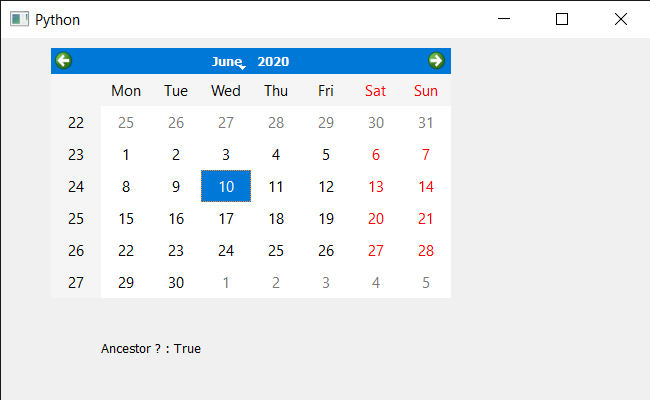PyQt5 QCalendarWidget - 检查它是否是给定小部件的祖先
在本文中,我们将看到如何检查 QCalendarWidget 是否是给定小部件的祖先。为此,我们使用isAncestorOf方法,如果日历是给定子级的父级(或祖父级等任何级别),并且两个小部件位于同一窗口内,则此方法返回 true;否则返回假。
In order to do this we will use isAncestorOf method with the QCalendarWidget object.
Syntax : calendar.isAncestorOf(query)
Argument : It takes QWidget object as argument
Return : It return bool
下面是实现
Python3
# importing libraries
from PyQt5.QtWidgets import *
from PyQt5 import QtCore, QtGui
from PyQt5.QtGui import *
from PyQt5.QtCore import *
import sys
class Window(QMainWindow):
def __init__(self):
super().__init__()
# setting title
self.setWindowTitle("Python ")
# setting geometry
self.setGeometry(100, 100, 650, 400)
# calling method
self.UiComponents()
# showing all the widgets
self.show()
# method for components
def UiComponents(self):
# creating a QCalendarWidget object
self.calendar = QCalendarWidget(self)
# setting geometry to the calendar
self.calendar.setGeometry(50, 10, 400, 250)
# setting cursor
self.calendar.setCursor(Qt.PointingHandCursor)
# creating label to show the properties
self.label = QLabel(self)
# setting geometry to the label
self.label.setGeometry(100, 280, 250, 60)
# making label multi line
self.label.setWordWrap(True)
# getting third child of the calendar
child = self.calendar.children()[3]
# checking if the calendar is ancestor of the child
value = self.calendar.isAncestorOf(child)
# setting text to the label
self.label.setText("Ancestor ? : " + str(value))
# create pyqt5 app
App = QApplication(sys.argv)
# create the instance of our Window
window = Window()
# start the app
sys.exit(App.exec())输出: 